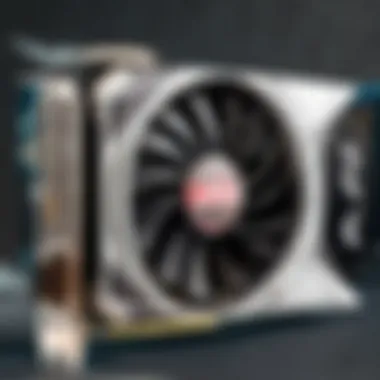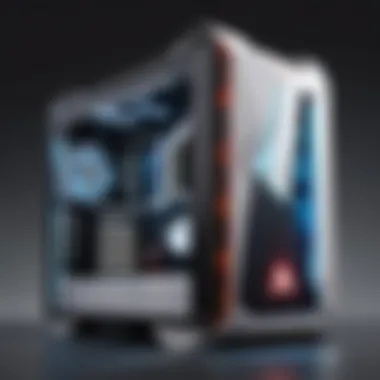Unleashing the Power: A Comprehensive Guide to Gaming PC Specifications


Game Overview
When embarking on the journey of building a high-performance gaming PC, it is pivotal to delve into the intricate world of specifications that will elevate your gaming experience to new heights. Each component - from the graphics card to the processor - plays a pivotal role in determining the quality of gameplay you can achieve. For both casual gamers seeking smooth performance and serious enthusiasts pushing the limits of graphical fidelity, a deep understanding of these specifications is paramount.
Introduction to Specifications
To commence our exploration, let us unravel the fundamental specifications that form the backbone of a gaming PC. Understanding the significance of metrics like GPU memory, clock speeds, and core counts will empower you to make informed decisions when selecting components for your rig. This detailed breakdown will serve as the foundation upon which we will build our knowledge and expertise in optimizing gaming performance.
Choosing the Right Graphics Card
One of the cornerstone components in any gaming PC is the graphics card. The GPU dictates the visual quality and rendering speeds of your games, making it a crucial element to consider. As we navigate through the realm of graphics cards, we will analyze factors such as VRAM capacity, bus width, and CUDA cores to demystify the technical jargon and streamline the selection process. By the end of this section, you will have a comprehensive understanding of what specifications to prioritize when investing in a graphics card for your gaming setup.
Unveiling Processor Power
In tandem with a robust graphics card, a high-performance processor is essential for seamless gaming experiences. Delving into the realm of CPUs, we will dissect specifications such as core count, clock speed, and cache size to unravel the intricacies of processor performance. Whether you favor AMD Ryzen or Intel Core processors, grasping the nuances of these specifications will empower you to make an informed decision that aligns with your gaming preferences.
Maximizing Memory and Storage
Beyond the GPU and CPU, optimizing memory and storage specifications is imperative for a well-rounded gaming PC. From RAM speeds to storage types, each specification impacts loading times, multitasking capabilities, and overall system responsiveness. By exploring the nuances of memory and storage specifications, you will gain insights into balancing capacity, speed, and latency to fine-tune your gaming rig for peak performance.
Elevating the Gaming Experience
As we navigate through the labyrinth of gaming PC specifications, we must approach each component with meticulous attention to detail and strategic foresight. By honing our understanding of graphics cards, processors, memory, and storage, we embark on a journey towards unlocking the true potential of our gaming setups. Through comprehensive knowledge and informed decision-making, we can transcend technological barriers and immerse ourselves in a gaming experience tailored to our unique preferences and aspirations.
Introduction
In the vast universe of gaming PCs, understanding the intricate web of specifications is vital to elevate your gaming escapades to the next level of experience. From the heart of processing power to the visual extravaganza delivered by graphics components, each specification woven into the DNA of your PC impacts the quality of your gameplay. Whether you're a seasoned gaming enthusiast or a casual player seeking to delve deeper into the realm of high-performance computing, comprehending these specifications paves the path to unlocking the full potential of your gaming rig.
Brief Description of Gaming PC Specifications
Intricate Details that Impact Gaming Experience
Delving into the minutiae of gaming PC specifications reveals a fascinating realm where the tiniest nuances can sway your gaming encounters from mundane to breathtaking. The intrinsic details such as core counts in processors, memory capacities in RAM modules, and pixel-pumping prowess in graphics cards intricately mold the landscape of gaming bliss. These aspects aren't merely technicalities but rather the building blocks that lay the foundation for an immersive and responsive gameplay experience.
Unpacking the significance of core counts in processors unveils their pivotal role in shouldering the computational burden of modern gaming titles. Higher core counts not only denote improved multitasking capabilities but also translate to smoother gameplay, especially in titles that thrive on multithreaded performance. Likewise, the memory capacity and speed of RAM modules determine the efficiency with which your system can juggle multiple tasks, ensuring seamless transitions between in-game actions.
Furthermore, the graphics quality rendered by GPUs and the fluidity of frame rates they deliver carry profound implications for your visual voyage into the gaming realm. A judicious selection of GPUs can redefine the graphical fidelity of your favorite titles, breathing life into environments and characters with unprecedented realism. Concurrently, higher frame rates facilitate buttery-smooth gameplay, erasing lags and stutters that might otherwise hamper your competitive edge.
These intricate details are not merely technical abstractions but transformative elements that can revolutionize your gaming encounters. Understanding their nuances empowers you to make informed decisions when configuring your gaming rig, ensuring that every component harmonizes to deliver a cinematic gaming experience that transcends expectations.
Central Processing Unit (CPU)
Building a gaming PC involves meticulous consideration of every component. Among these, the Central Processing Unit (CPU) stands out as a cornerstone element. The CPU is akin to the brain of the system, responsible for executing instructions and performing calculations. The importance of the CPU in a gaming PC cannot be overstated; it directly impacts the overall speed and efficiency of the system, influencing gameplay smoothness and responsiveness.


Importance of CPU in Gaming PCs
Processing Power and Core Count
When delving into the realm of CPUs, two crucial factors come into play: processing power and core count. Processing power refers to the CPU's ability to handle complex tasks swiftly. A higher processing power translates to faster loading times, seamless multitasking, and overall improved performance. On the other hand, core count denotes the number of physical cores within the CPU. More cores equate to better multitasking capabilities, as each core can handle separate operations simultaneously.
In the landscape of gaming PCs, CPUs with substantial processing power and core count are highly sought after for their ability to run resource-demanding games smoothly. Gamers benefit from enhanced frame rates, reduced lag, and immersive gameplay experiences. However, it is essential to strike a balance between processing power and core count to ensure optimal performance based on individual gaming needs.
Considering the unique demands of modern gaming titles, CPUs with higher processing power and more cores are often favored for their ability to handle intensive graphics rendering and artificial intelligence computations efficiently. However, it is imperative to assess whether the CPU aligns with the gaming requirements and budget constraints, as high-end CPUs with advanced features may not always be necessary for every gamer's setup.
Central Processing Unit (CPU)
In the realm of Gaming PC specifications, the Central Processing Unit (CPU) stands as a pivotal component essential for optimal performance. The importance of the CPU in Gaming PCs cannot be overstated, playing a critical role in driving processing power and core count, factors that significantly impact the overall gaming experience. A robust CPU ensures seamless operation, quick response times, and efficient multitasking capabilities, catering to the demands of modern gaming applications.
Significance of CPU for Gaming Performance
Processing power and core count:
When delving into the specifics of Gaming PC performance, the processing power and core count of the CPU emerge as key determinants. The processing power, dictated by the CPU's clock speed and architecture, directly influences the system's ability to handle complex computations and run resource-intensive games with ease. Additionally, the core count of a CPU, ranging from dual-core to multi-core configurations, plays a crucial role in parallel processing, enabling smoother gameplay, enhanced frame rates, and overall improved gaming performance.
Graphics Processing Unit (GPU)
Embarking on the next essential component, the Graphics Processing Unit (GPU) takes center stage in the landscape of Gaming PC specifications. The GPU's significance for gaming performance transcends mere visuals, encompassing aspects of graphics quality and frame rates that are instrumental in delivering a captivating gaming experience. As the cornerstone of rendering graphical content, a potent GPU paves the way for immersive gameplay, realistic visuals, and seamless frame transitions.
Significance of GPU for Gaming Performance
Graphics quality and frame rates:
Engaging with the intricacies of GPU performance, the interplay between graphics quality and frame rates emerges as a vital facet for overall gaming prowess. Graphics quality, characterized by details, textures, and shading intricacies, defines the visual richness of games, elevating immersion levels for players. Concurrently, frame rates denote the frequency at which consecutive images are displayed, directly impacting game fluidity and responsiveness. Balancing graphics quality and frame rates is crucial, as it ensures a harmonious blend of visual fidelity and smooth gameplay, optimizing the gaming experience for enthusiasts and casual players alike.
Random Access Memory (RAM)
Random Access Memory (RAM) is a critical component in a gaming PC setup, playing a pivotal role in ensuring smooth and efficient operations during gaming sessions. Unlike storage drives, RAM provides quick access to data for the CPU, significantly impacting the overall performance of the system. The amount and speed of RAM installed directly influence the system's multitasking capabilities and gaming experience.
Memory Capacity and Speed
In the realm of gaming PCs, memory capacity and speed are paramount considerations. The capacity of RAM determines how much data can be stored temporarily for immediate access, affecting the system's ability to handle multiple processes simultaneously. A higher memory capacity allows for seamless multitasking, smoother gameplay, and quicker loading times for games and applications.
On the other hand, the speed of RAM, measured in megahertz (MHz), determines how fast data can be accessed and transferred within the system. Faster RAM speeds result in reduced lag, improved responsiveness, and enhanced overall performance, particularly in resource-intensive games. Gamers often opt for high-speed RAM for optimal gaming experiences, as it enables quick data access for seamless gameplay and reduced latency.
In essence, the combination of sufficient memory capacity and high-speed RAM is essential for gamers looking to elevate their gaming experience. While higher memory capacity enhances multitasking efficiency, faster RAM speeds ensure swift data processing and responsiveness, both crucial elements in competitive gameplay scenarios. Understanding the significance of memory capacity and speed empowers gamers to make informed decisions when selecting RAM modules for their gaming rigs.
Storage Options
When it comes to building a high-performance gaming PC, one crucial aspect that often gets overlooked is the choice of storage options. The Storage Options section in this comprehensive guide sheds light on the significance of selecting the right storage medium for your gaming rig. This decision can greatly impact the speed, performance, and overall gaming experience of your system.


Choosing the Right Storage for Gaming Needs
In the realm of gaming PC specifications, the comparison between Solid State Drives (SSD) and Hard Disk Drives (HDD) holds paramount importance. The SSD vs. HDD comparison plays a pivotal role in determining the storage efficiency and speed of your system. One key characteristic of SSDs is their lightning-fast read and write speeds, which significantly reduce loading times in games and boost overall system responsiveness. On the other hand, HDDs are known for their larger storage capacities at a lower cost per gigabyte, making them an economical choice for mass storage needs.
When delving deeper into the SSD vs. HDD comparison, it is essential to note that SSDs excel in providing faster data access, leading to quicker boot times and application loading. Additionally, SSDs have no moving parts, making them more durable and less susceptible to mechanical failures compared to HDDs. Conversely, HDDs offer higher storage capacities, making them ideal for storing large game libraries or multimedia content at a lower price point. However, HDDs lag behind SSDs in speed and performance due to their mechanical nature.
In this article, the SSD vs. HDD comparison aims to guide gaming enthusiasts in making an informed decision based on their specific storage needs and budget constraints. By understanding the unique features and advantages of SSDs and HDDs, readers can tailor their storage selection to optimize gaming performance and storage efficiency according to their preferences and requirements.
Motherboard Considerations
When it comes to building a gaming PC, the motherboard is a crucial element that often gets overlooked amidst the flashier components. However, its importance cannot be overstated, as the motherboard serves as the backbone that connects all the other parts of your system. The motherboard's layout and features significantly influence your build's overall performance and compatibility. Selecting the right motherboard can impact everything from processor support to RAM capacity and expansion options.
Impact of Motherboard on PC Performance
Compatibility and Expansion Options
One key aspect of a motherboard that directly impacts PC performance is its compatibility and expansion capabilities. A motherboard with a wide range of compatibility ensures that you can choose from various processors, RAM configurations, and expansion cards suited to your gaming needs. Additionally, the expansion slots available on a motherboard allow for future upgrades, such as adding more storage or upgrading to a better graphics card without needing to replace the entire unit. This flexibility provides longevity to your gaming rig and keeps it relevant amidst rapidly advancing hardware technologies. However, while extensive expansion options are beneficial, it's essential to strike a balance to avoid paying for features you might never use. Understanding the compatibility and expansion options of your motherboard is crucial for optimizing performance and future-proofing your gaming setup.
Cooling Solutions
When it comes to building a high-performance gaming PC, one crucial aspect that often gets overlooked is the cooling solution. Efficient temperature management is vital to ensure that your components operate optimally and prevent overheating issues. Cooling solutions play a significant role in maintaining the stability and longevity of your system by dissipating heat generated during intense gaming sessions.
Ensuring Optimal Temperature Management
Air Cooling vs. Liquid Cooling
In the realm of cooling solutions, two primary options exist: air cooling and liquid cooling. Air cooling relies on fans and heat sinks to draw heat away from components, while liquid cooling utilizes a coolant-filled loop to transfer heat more efficiently. The key differentiator between the two lies in their thermal conductivity and noise levels. Air cooling, being simpler and more cost-effective, is a popular choice for many gamers seeking adequate thermal regulation. On the other hand, liquid cooling excels in dissipating heat rapidly, making it ideal for overclocking and maintaining lower temperatures under heavy workloads. Although liquid cooling can offer superior performance, it comes at a higher cost and requires more maintenance compared to air cooling. Understanding these distinctions is essential for selecting the most suitable cooling solution tailored to your gaming needs.
Power Supply Unit (PSU)
In the realm of building a gaming PC, the Power Supply Unit (PSU) holds a critical role that often goes unnoticed amidst the flashy components like GPUs and CPUs. However, the PSU is the unsung hero, providing power to all the components and ensuring smooth functioning of the entire system. It serves as the heart of your gaming rig, translating electricity from your wall outlet into energy that fuels your PC's operations. When considering a PSU for your gaming setup, several elements come into play to guarantee optimal performance and stability.
Selecting the Right PSU for Your Gaming Rig
When delving into the world of PSUs, two key aspects demand consideration: Wattage requirements and efficiency ratings. These factors profoundly impact the overall performance and reliability of your gaming setup, ultimately determining the extent of power delivery and energy conservation in your system.
Wattage Requirements and Efficiency Ratings
The Wattage requirement of a PSU is its capacity to deliver power to the components within your PC. It is crucial to match the PSU's Wattage output with the total power consumption of your system to prevent under-powering or overloading - ensuring a smooth and stable operation. Similarly, efficiency ratings denote the PSU's ability to convert input power into usable output power, denoted as a percentage. Opting for a PSU with a higher efficiency rating results in reduced energy wastage and heat dissipation, enhancing the overall longevity and reliability of your gaming setup.
Exploring Wattage requirements and efficiency ratings in-depth reveals their indispensable role in optimizing power distribution and minimizing energy loss within your gaming rig. By considering these factors thoughtfully during PSU selection, you pave the way for a robust and efficient PC performance, elevating your gaming experience to new heights.
Monitor and Display


In the realm of PC gaming, the monitor and display system are pivotal components that directly impact the overall gaming experience. A high-quality monitor with optimal specifications can significantly enhance visual clarity, color accuracy, and gameplay fluidity. When choosing a monitor for your gaming setup, several key elements need consideration to ensure maximum productivity and enjoyment.
Choosing the Ideal Monitor for Gaming
Refresh Rate and Resolution
The refresh rate and resolution of a monitor play critical roles in determining the smoothness and visual fidelity of gaming graphics.
In the context of this article, a high refresh rate, such as 144Hz or 240Hz, provides ultra-smooth motion and reduces motion blur, enhancing the overall gaming experience. This fluidity is particularly beneficial in fast-paced games where quick reaction times are essential. Additionally, a higher refresh rate contributes to reduced input lag, resulting in more responsive gameplay.
On the other hand, resolution, such as 1080p, 1440p, or 4K, impacts the level of detail and sharpness in visual content. Higher resolutions offer crisper images and improved immersion, especially in visually-intensive games with intricate details. However, it's essential to note that higher resolutions may require more powerful graphics processing for optimal performance.
The unique feature of balancing refresh rate and resolution lies in finding the optimal configuration based on personal preferences and hardware capabilities. While a high refresh rate enhances motion fluidity, a higher resolution increases visual fidelity. The choice between the two depends on individual gaming preferences and the hardware constraints of the gaming setup.
Peripherals
When delving into the realm of building a high-performance gaming PC, one mustn't overlook the critical role that peripherals play in enhancing the overall gaming experience. While components like CPUs and GPUs take the spotlight, peripherals such as gaming keyboards, mice, and headsets are the unsung heroes that significantly impact gameplay.
These peripherals are not mere accessories but essential tools that can make or break your gaming sessions. The right peripherals can provide better responsiveness, precision, and immersion, essential for competitive gaming or simply enjoying the gaming world to its fullest.
Ergonomics, key features, and customization options are key considerations when choosing peripherals. Each peripheral is designed with specific functionalities tailored to cater to varying gaming needs. Understanding these nuances can empower gamers to make informed decisions for an optimal gaming setup.
Enhancing Your Gaming Experience with the Right Accessories
Gaming Keyboard, Mouse, and Headset
Focusing on gaming keyboards, mice, and headsets, these peripherals offer distinct advantages tailored to meet different gaming demands. Gaming keyboards are equipped with anti-ghosting features and customizable RGB lighting to enhance aesthetics and functionality simultaneously.
On the other hand, gaming mice come with adjustable DPI settings, programmable buttons, and ergonomic designs to ensure precise movements and comfortable grip during intense gaming sessions. Additionally, gaming headsets provide immersive audio quality, noise cancellation features, and built-in microphones for seamless communication with fellow gamers.
The unique feature set of gaming peripherals allows gamers to personalize their setup for enhanced comfort, performance, and style. While these peripherals elevate the gaming experience, it's crucial to weigh factors like comfort, compatibility, and durability when selecting the right accessories for your gaming rig.
Operating System
When crafting the ultimate gaming PC, one indispensable consideration is the choice of operating system (OS). The OS acts as the foundation, orchestrating the hardware components into a cohesive gaming rig. Selecting the right OS can significantly impact performance, compatibility, and user experience, thus warranting meticulous attention.
Choosing the Best OS for Gaming (Windows vs. Linux vs. macOS)
In the realm of OS selection for gaming, the battleground is often fought among Windows, Linux, and macOS. Each OS presents distinct characteristics that cater to different preferences and requirements. Windows, the reigning champion in market share, offers extensive gaming compatibility, a vast library of game titles, and robust driver support, making it a preferred choice for many gamers worldwide. Linux, renowned for its stability and customization options, appeals to tech-savvy gamers seeking performance optimization and open-source flexibility. On the other hand, macOS, known for its sleek interface and seamless integration with Apple hardware, provides a streamlined gaming experience for enthusiasts within the Apple ecosystem.
Delving deeper, Windows excels in gaming due to its broad software and driver support, ensuring seamless plug-and-play functionality for most games and hardware configurations. Nonetheless, its susceptibility to system vulnerabilities and occasional resource-heavy operations might pose challenges in certain gaming scenarios. Linux, celebrated for its lightweight nature and advanced customization capabilities, empowers gamers to fine-tune their systems for optimal performance and security, albeit at the cost of limited game compatibility compared to Windows. Meanwhile, macOS stands out for its user-friendly interface, efficient resource management, and exclusive access to Apple Arcade titles, offering a curated gaming experience for Apple aficionados.
Conclusion
In wrapping up this comprehensive guide to specifications for building an optimal gaming PC, it is crucial to recap the significance of paying careful attention to each component discussed throughout this article. Understanding the intricate details from the CPU to peripherals plays a pivotal role in enhancing one's gaming experience. By delving into the world of gaming PC specifications, users, whether casual gamers or enthusiasts, can make informed decisions to elevate performance and overall enjoyment. Taking the time to select the right components can truly make a difference in the quality of gaming sessions.
Final Thoughts on Optimizing Your Gaming PC
Maximizing Performance and Enjoyment
Maximizing performance and enjoyment in gaming PCs stands as the pinnacle of this guide, embodying the essence of the ultimate gaming experience. This aspect focuses on achieving the highest level of computational power and user satisfaction. The key characteristic lies in fine-tuning every element of the PC setup to extract peak performance and ensure seamless gameplay. It is a popular choice among gamers seeking to push the boundaries of their gaming rig’s capabilities. The unique feature of maximizing performance and enjoyment is the ability to customize settings and hardware to cater to individual preferences and gaming requirements. This flexibility offers users an edge in optimizing their gaming experience, although it requires a good understanding of hardware and software interactions. Striking the right balance between performance and enjoyment is necessary to create a gaming environment that is both immersive and responsive.



